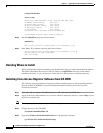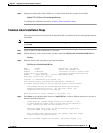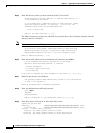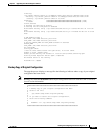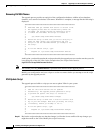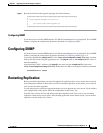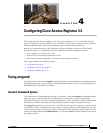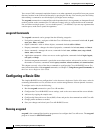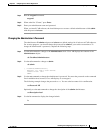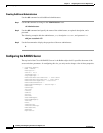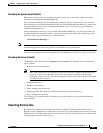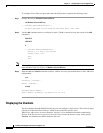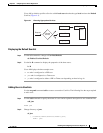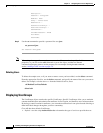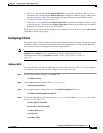
4-2
Installing and Configuring Cisco Access Registrar, 4.2
OL-17221-02
Chapter 4 Configuring Cisco Access Registrar 4.2
Configuring a Basic Site
You can use CAR’s command completion feature to see what commands are possible from your current
directory location in the CAR server hierarchy by pressing the Tab key. You can also press the Tab key
after entering a command to see which objects you might want to manage.
The aregcmd commands are command-line order dependent; that is, the arguments are interpreted based
on their position on the command line. To indicate an empty string as a place holder on the command
line, use either two single quotes ('') or two double quotes (""). In addition, if you use any arguments that
contain spaces, make sure to quote the arguments.
aregcmd Commands
The aregcmd commands can be grouped into the following categories:
• Navigation commands—navigates within the Cisco AR hierarchy; commands include cd, ls, pwd,
next, prev, filter, and find.
• Object commands—adds or deletes objects; commands include add and delete.
• Property commands—changes the value of properties; commands include set, unset, and insert.
• Server commands—manages the server; commands include save, validate, start, stop, reload,
status, stats, and trace.
• Application commands—allows user access to the application; commands include login, logout,
exit, quit, and help.
• Session management commands—queries the server about sessions, release active sessions, or count
the number of sessions; commands include query-sessions, release-sessions, and count-sessions..
This chapter uses only a few of the above commands to configure the Cisco AR RADIUS server. For
more information about all the aregcmd commands, see Chapter 2, Using the aregcmd Commands, in
the Cisco Access Registrar User Guide.
Configuring a Basic Site
The simplest RADIUS server configuration is a site that uses a single user list for all its users, writes its
accounting information to a file, and does not use session management to allocate dynamic resources.
To configure such a site, do the following:
1. Run the aregcmd command on your Cisco AR machine.
2. Configure the Cisco AR RADIUS server settings, such as the server name and the server defaults.
3. Add users by copying the sample users.
4. Configure the Network Access Server(NAS) clients and proxies that communicate with Cisco AR.
5. Change profile attributes as needed.
6. Save your changes and reload your Cisco AR RADIUS server.
Running aregcmd
aregcmd is the command-line interface program used to configure the Cisco AR server. The aregcmd
program is located in $INSTALL/usrbin.



